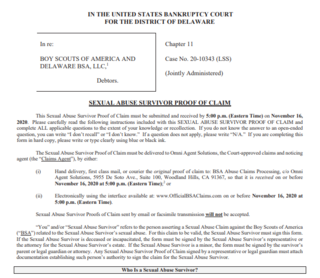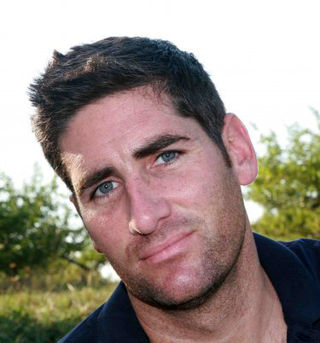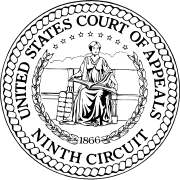
The American Civil Liberties Union (ACLU) is an American nonprofit civil rights organization founded in 1920. ACLU affiliates are active in all 50 states, Washington, D.C., and Puerto Rico. The ACLU provides legal assistance in cases where it considers civil liberties at risk. Legal support from the ACLU can take the form of direct legal representation or preparation of amicus curiae briefs expressing legal arguments when another law firm is already providing representation.

The Boy Scouts of America is one of the largest scouting organizations and one of the largest youth organizations in the United States, with over 1 million youth, including 176,000 female participants. The BSA was founded in 1910; about 130 million Americans have participated in its programs, which are served by 477,000 adult volunteers. BSA became a founding member organization of the World Organization of the Scout Movement in 1922.
Boy Scouts of America et al. v. Dale, 530 U.S. 640 (2000), was a landmark decision of the US Supreme Court, decided on June 28, 2000, that held that the constitutional right to freedom of association allowed the Boy Scouts of America (BSA) to exclude a homosexual person from membership in spite of a state law requiring equal treatment of homosexuals in public accommodations. More generally, the court ruled that a private organization such as the BSA may exclude a person from membership when "the presence of that person affects in a significant way the group's ability to advocate public or private viewpoints". In a 5-4 decision, the Supreme Court ruled that opposition to homosexuality is part of BSA's "expressive message" and that allowing homosexuals as adult leaders would interfere with that message.

A variety of religious emblems programs are used by the Boy Scouts of America (BSA) to encourage youth to learn about their faith and to recognize adults who provide significant service to youth in a religious environment. These religious programs are created, administered and awarded by the various religious groups, not the BSA, but each program must be recognized by the BSA.
Liberty Counsel is a 501(c)(3) Christian ministry that engages in strategic litigation to promote evangelical Christian values. Liberty Counsel was founded in 1989 by its chairman Mathew Staver and its president Anita L. Staver, who are attorneys and married to each other. The Southern Poverty Law Center has listed Liberty Counsel as an anti-LGBT hate group, a designation the group has disputed. The group is a Christian ministry.
The Boy Scouts of America (BSA), one of the largest private youth organizations in the United States, has policies which prohibit those who are not willing to subscribe to the BSA's Declaration of Religious Principle, which has been interpreted by some as banning atheists, and, until January 2014, prohibited all "known or avowed homosexuals", from membership in its Scouting program. The ban on adults who are "open or avowed homosexuals" from leadership positions was lifted in July 2015.
Randall v. Orange County Council, 17 Cal.4th 736, 952 P.2d 261, 72 Cal.Rptr.2d 453 (1998), was a case before the Supreme Court of California that established that groups such as the Boy Scouts of America are not considered "business establishments" as used in the state's Unruh Civil Rights Act and could not be subject to its provisions. Its companion case was Curran v. Mount Diablo Council of the Boy Scouts of America, 17 Cal.4th 670, 952 P.2d 218, 72 Cal.Rptr.2d 410 (1998).

Welsh v. Boy Scouts of America, 993 F.2d 1267, was a decision by the United States Court of Appeals for the Seventh Circuit that upheld the right of private organizations to discriminate on the basis of religion when establishing their own membership standards.

The Support Our Scouts Act of 2005 was passed as part of the Department of Defense Appropriations Act, 2006 to prevent Local, State and Federal agencies from reducing their support for the Boy Scouts of America. The bill was passed in the wake of a number of controversies involving the Boy Scouts of America, such as their exclusion of gays and atheists, and subsequent attempts to limit government support of the organization.
Becket, also known as the Becket Fund for Religious Liberty, is a non-profit public interest law firm based in Washington, D.C., that describes its mission as "defending the freedom of religion of people of all faiths". Becket promotes accommodationism and is active in the judicial system, the media, and in education.

Winkler v. Rumsfeld was a case regarding the United States Armed Forces and their support of the Boy Scouts of America's national Scout jamborees.
Evans v. Berkeley was a court case which upheld the right of governmental entities in California to withhold support from non-profit organizations that practice discrimination on the basis of sexual orientation.

The Boy Scouts of America (BSA) was inspired by and modeled on The Boy Scouts Association, established by Robert Baden-Powell in Britain in 1908. In the early 1900s, several youth organizations were active, and many became part of the BSA.

Religion in Scouting and Guiding is an aspect of the Scout method that has been practiced differently and given different interpretations in different parts of the world over the years.

There are various controversies and conflicts that involve the Scouting movement. Scouting has sometimes become entangled in social controversies such as in nationalist resistance movements in India. Scouting was introduced to Africa by British officials as an instrument of colonial authority but became a subversive challenge to the legitimacy of British imperialism as Scouting fostered solidarity amongst African Scouts. There are also controversies and challenges within the Scout Movement itself such as current efforts to turn Scouts Canada into a democratic organization.

The Mount Soledad Cross is a prominent landmark located on top of Mount Soledad in the La Jolla neighborhood of San Diego, California. The present structure was erected in 1954; it is the third Christian cross in that location, the first having been put up in 1913. Architect Donald Campbell designed the present cross in prestressed concrete. It is 29 feet (8.8 m) tall with a 12-foot (3.7 m) arm spread. It is the centerpiece of the Mt. Soledad National Veterans Memorial.

Cradle of Liberty Council, Inc., Boy Scouts of America, v. City of Philadelphia also known as Cradle of Liberty Council v. City of Philadelphia, [2:08-cv-02429RB] is a U.S. Court case involving the Cradle of Liberty Council versus the City of Philadelphia. The case was filed on May 23, 2008, in the United States District Court for the Eastern District of Pennsylvania. Judge Ronald L. Buckwalter presided over the case. The Boy Scouts were represented by Drinker Biddle & Reath. The case ended with the court ruling in favor of the Boy Scouts of America. The Cradle of Liberty Council Council is also entitled to collect $877,000 of legal costs from the city's unlawful action.

The Boy Scouts of America (BSA) is one of the largest youth organizations in the United States, with 2.3 million youth members and approximately 889,000 adult volunteers in 2017. In 1979 there were over 5 million youths in BSA.

James Dale is an American gay rights activist. He is best known for his role in Boy Scouts of America v. Dale, the landmark US Supreme Court case that challenged the Boy Scouts of America (BSA) policy of excluding gay scouts from being scout leaders.











